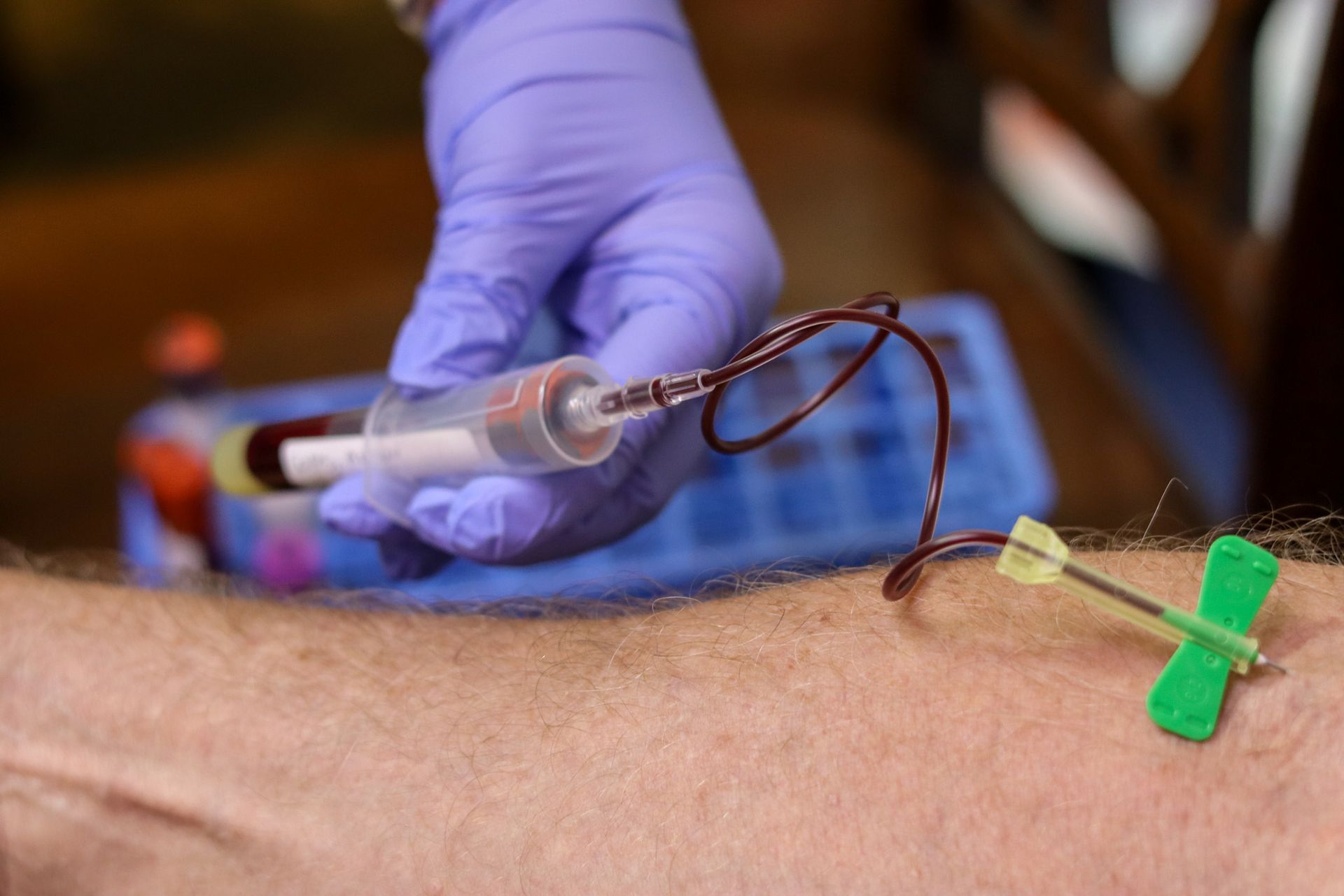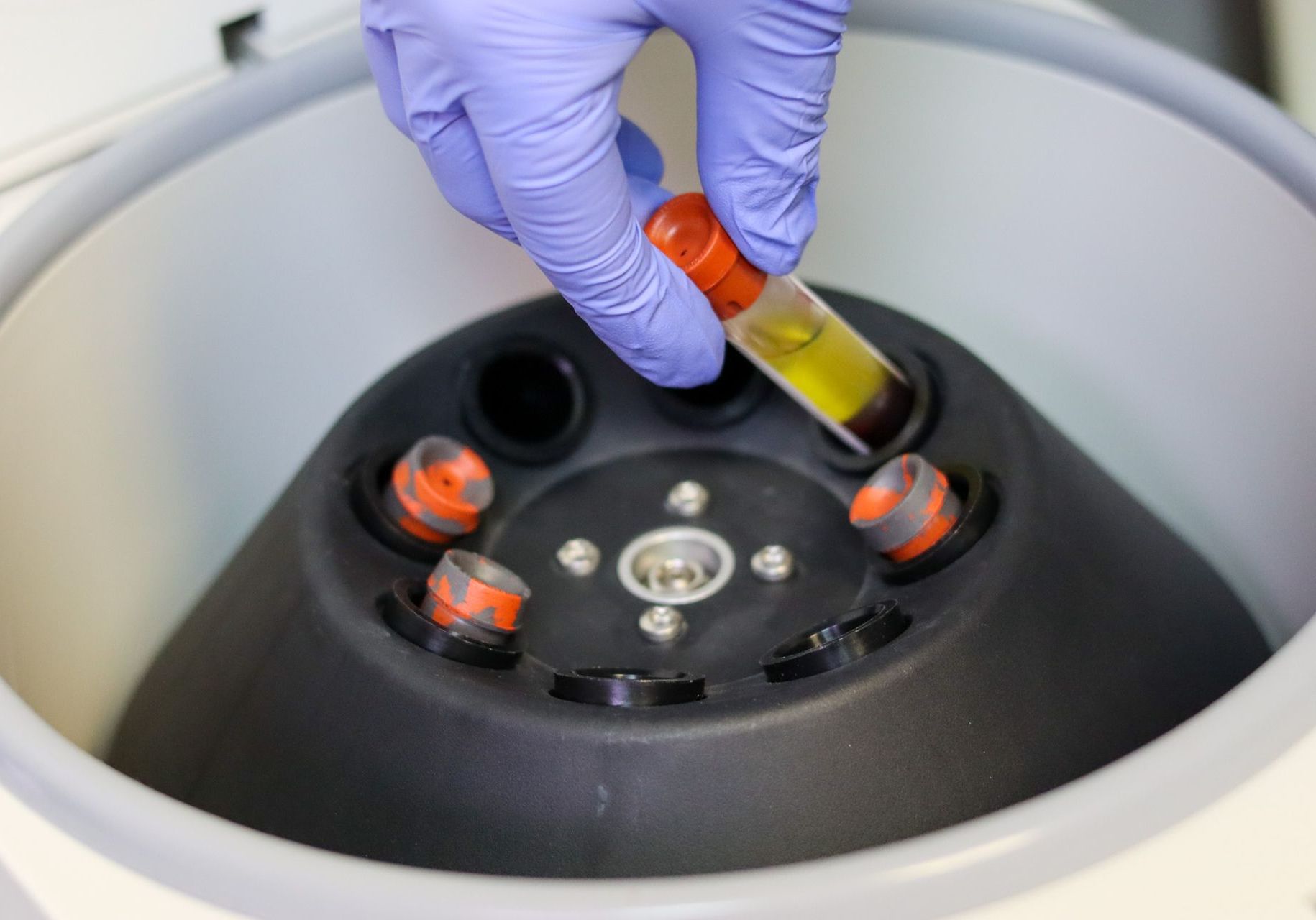Blood work
Blood work is the basis of everything we use to begin diagnosis and treatment. We use an extensive blood work panel to assess the individual organ function and identify if the presence of viruses, bacteria, parasites and hormonal imbalances could be the underlying cause. *A third party lab is used off site and takes 3-5 days to receive results.
Genetics
Genetic testing analyzes a person's DNA to look for genetic variations or mutations that may impact their health. It can be used to:
Screen for genetic diseases or conditions someone may be at risk for based on their family history. This allows early detection and treatment. For example, testing for BRCA gene mutations in women can indicate higher risk of breast and ovarian cancer.
Diagnose genetic disorders in symptomatic individuals. Genetic testing can confirm or rule out a suspected genetic condition based on someone's symptoms. For example, testing can diagnose Down syndrome, cystic fibrosis, or Huntington's disease.
Determine carrier status for recessive disorders. Carriers of a genetic mutation typically do not show symptoms, but can pass the mutation to their children. Testing allows people to learn if they carry mutations for conditions like sickle cell anemia, Tay-Sachs disease, or cystic fibrosis.
Guide treatment for certain cancers and other conditions. Knowing someone's genetic makeup can help predict their risk of certain diseases and determine which treatments will be most effective based on their genetics.
Provide insight into how someone may respond to certain medications based on their genetics. This is called pharmacogenomics.
The key benefits are allowing people to make more informed medical choices and manage disease risks if they do turn out to have a genetic predisposition. Genetic testing gives patients and doctors valuable information to improve preventive care and make personalized treatment decisions.
Gx Sciences
GX Sciences is an advanced genetic testing company with the most comprehensive Nutrigenomic (NGx) and Pharmacogenomic (PGx) testing interpretation platform available. Their cutting-edge technology allows for a detailed analysis of how an individual's genetic makeup influences their response to nutrients and medications, providing invaluable insights for personalized healthcare.
The tests require a blood draw or saliva sample that gets analyzed at GX Sciences' lab. This non-invasive collection process ensures patient comfort while still providing highly accurate genetic information for analysis. Results are provided through an online portal within 1-2 weeks, then Dr. Art will go over the data with the patient. This personalized consultation ensures that patients fully understand their genetic profile and can make informed decisions about their health and wellness strategies based on their unique genetic makeup.
HERE IS A LIST OF THE PROVIDED PANELS
Comprehensive Panel (pro7)
For patients who are overall healthy and desiring nutritional guidance, have no significant family history of disease, have basic problems with intestinal health and allergies or want a health plan, fitness regimen or anti-aging program.
Neurotransmitter Panel
Billions of neurons exist in the brain and they all need to work appropriately. These cells share information with other nerve cells through electrical impulses, allowing for thought and communication throughout the body.
Pharmacogenomic Panel
PGx, refers to a type of genetic test by cheek swab to predict a patient’s likelihood to experience an adverse event or not respond to a given drug.
Immune/Auto-immune/Inflammatory
Genetic testing for inflammation can be a valuable tool in both prevention and treatment of inflammatory issues through an understanding of a person’s genetic predisposition and nutrient utilization. Only by understanding a problem can a solution be found.
Developmental Panel
Spectrum disorders-Childhood attention disorders-Speech delay,-Reading, writing, and counting/math trouble-Auditory disorders- Seizure related disorder. This panel will take the patient’s genetic results and create nutritional and lifestyle recommendations along with recommended lab work and health precautions.
Foundation/Methylation/Wellness
Panel21 genes have been chosen by our experts to be analyzed for SNPs. The report algorithms and customized software will take the patient’s genetic results and create nutritional and lifestyle recommendations.
Gastrointestinal (GI) Panel
This panel is designed to provide a scientifically validated system to indicate the need for a specific supplement or medication based on an individual’s genetic profile.
Autophagy panel
You may be feeding your body the correct nutrients, but they are useless if your body’s cells can’t absorb them properly. An Autophagy genetic test is one of the only ways to know whether your internal cellular recycling system is intact.
Chronic Pain Panel
Aims to bring validity to patients’ pain while supplying providers the knowledge they need to create a personalized chronic pain treatment protocol for their patients so they can live a normal day-to-day life.
Traumatic Brain Injury Panel (TBI)
Consists of 24 gene variants (SNPs) that have been chosen by our medical experts which play a significant role in the patient’s ability to maximize their recovery potential following a head injury.
Detoxification Panel
The Detoxification Panel helps providers analyze and identify underlying contributing factors to weight loss problems, gut complications, auto-immune issues, fatigue, and detoxification issues. This panel currently focuses on specific gene variants (SNPs) that can play a significant role in a patient’s ability to control or resolve complications related to “detox” struggles.
Diagnostic Solutions
Research overwhelmingly indicates that gut health impacts overall health. The gut microbiome, in particular, plays a critical role in mediating the effects of diet and other factors on health, including digestive, immune, metabolic and neuroendocrine functions. Assessing GI health with the proper tools can help practitioners get to the root cause of chronic illness.
The GI-MAP (Microbial Assay Plus) is unique in the field of comprehensive stool testing. It relies exclusively on quantitative polymerase chain reaction (qPCR) technology to detect parasites, bacteria, fungi, and more, by targeting the specific DNA of the organisms tested.
Who Should Have the GI-MAP Comprehensive Stool Analysis Done?
Almost every patient can benefit from a GI-MAP gut health assessment. Some patients are looking to achieve optimal health, while other patients have been chronically ill and frustrated without a diagnosis for years.
Some conditions that warrant testing are:
- Autoimmune diseases
- IBS/IBD
- Digestive complaints, diarrhea or constipation
- Brain fog
- Skin problems, like acne and psoriasis
- Mood disorders, depression, and anxiety
- Diabetes and weight loss issues
Can Infants and Children Benefit from the GI-MAP?
Yes. The GI-MAP is commonly used in infants and children, and can provide insight into conditions related to Attentional Deficit Hyperactivity Disorder, Autism, and digestive complaints.
DiagnosTechs Panels
DiagnosTechs was the first laboratory to introduce saliva testing for cortisol into routine practice. Building on that innovation, we now provide noninvasive saliva and stool test panels for a range of hormones, food sensitivities, microbes, pathogens, and parasites.
Tests:·
Adrenal Stress Index (ASI) can be helpful if you experience:
- Chronic stress and stress-related health conditions
- Fatigue or lack of energy
- Anxiety or depression
- Irritability or mood swings
- Insomnia, sleep disturbances or difficulty waking
- Difficulty losing weight
- Poor memory or difficulty retaining information
- Muscle and joint pain or weakness
- Easy bruising or excessive stretch marks
- Hypertension
Toxic Metals & Elements (TME)
Our unique TME testing helps determine if your metal and element levels may show potentially toxic levels linked to unexplained signs and symptoms. Your body needs small amounts of certain elements such as copper and zinc, but elevated levels of many metals and elements—such as lead, mercury, arsenic and cadmium—can be toxic at any level.
This test can also be helpful for evaluating patients who are at high risk of developing cancer, as well as those who are experiencing the following unexplained signs and symptoms:
- Joint and musculoskeletal pain
- Chronic fatigue
- Neurodegenerative diseases, such as amyotrophic lateral sclerosis (ALS) or Lou Gehrig’s disease
- Metabolic disorders (e.g. diabetes) and difficulty losing weight
- Anemia (a classic sign of chronic metal exposure)
- Cognitive dysfunction such as memory loss, Parkinson’s Disease and “brain fog”
- Heart abnormalities such as cardiomyopathy or abnormal heart beat (dysrhythmia)
- Nervous system symptoms (e.g. numbness, tingling of hands and feet, and weakness)
- Abdominal pain, nausea, vomiting, and diarrhea (hallmark symptoms with most cases of acute metal ingestion)
- Skin disorders such as eczema and/or psoriasis
- Autoimmune diseases, including rheumatoid arthritis
- Hypertension
- Renal disease
- Liver disease
Female Hormone can be helpful for patients with:
- Irregular or painful periods
- Infertility or miscarriage
- Premenstrual syndrome (mood changes, breast tenderness, water retention, uterine cramping)
- Low libido
- Facial hair growth
- Acne
- Migraines
Male Hormone
The Male Hormone Panel is a conveniently collected panel that provides information to begin restoring vitality, well-being, and passion for life. Seven different hormone levels are measured to display a comprehensive picture of male hormonal balance. The Expanded Male Hormone Panel adds a measurement for follicle stimulating hormone and luteinizing hormone for additional data points. Information about your hormone levels can be valuable when evaluating for conditions related to infertility, sexual dysfunction, and andropause—an age-related decline in male hormone levels.
Gastrointestinal Health
may be helpful for patients with:
- Chronic or vague abdominal pain or discomfort
- Gas or bloating
- Constipation
- Diarrhea or loose stools
- Abdominal cramping
- Heartburn or GERD
- Inflammatory bowel disease
- Changes in bowel habits
- Suspected or known malabsorption issues
- Chronic skin conditions
- Excessive eating or anorexia
- Chronic fatigue
Bone Health
The Bone Health Panel offers an objective way to monitor the efficacy of bone loss treatment strategies including correction of hormonal abnormalities, vitamin and mineral supplementation, dietary and lifestyle changes, and/or pharmacologic interventions. Our Bone Health Panel can detect decreases in bone density at an early stage allowing intervention before acute symptoms appear, and in contrast to traditional screening, our panel is noninvasive and does not involve x-ray radiation or blood draws.
Food Sensitivity
A food reaction is an abnormal response in the gastrointestinal (GI) system that can occur for a variety of reasons. In some cases, like lactose intolerance, there may be too little of a particular enzyme to digest a food correctly. In other cases, the immune system creates antibodies to proteins in foods. When a food reaction involves the immune system in this way, it is called a food allergy or food sensitivity.
When the immune system reacts to a food, it can lead to inflammation and irritation in the intestine each time the particular food is consumed. Food allergies and sensitivities can range in severity from immediate, sometimes life-threatening reactions (anaphylaxis) to milder symptoms such as gas and bloating.
Many food sensitivities produce minimal symptoms, yet if untreated, the long-term consequences can be serious and may involve the development of conditions in many different organ systems. The Diagnos-Techs Food Panel tests your saliva for antibodies to four of the most common food allergens.
Tests Included in the Food Panel:
The Food Panel (FP) measures antibodies (salivary IgA or sIgA) to some of the most common food allergens – gluten (gliadin), milk (casein), egg (ovalbumin), and soy (protein). It also includes a measurement of the total salivary sIgA to provide context for interpreting the food specific sIgA results.







